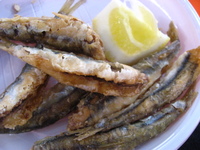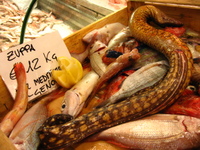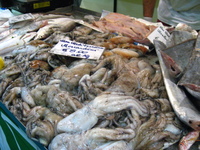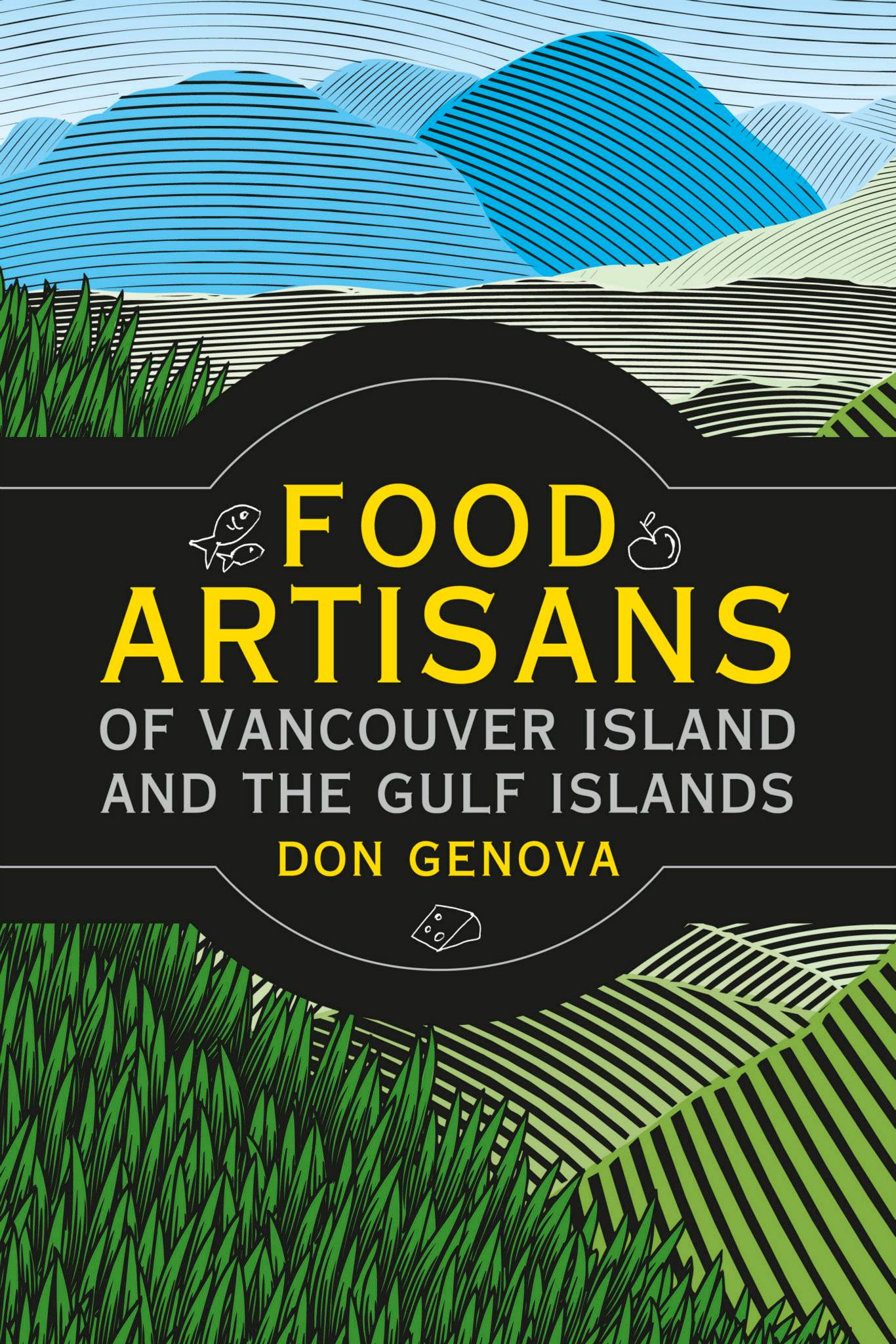 Ummmm…fried anchovies! Otherwise known as Cicciarelli, these are a Slow Food Presidia product fished from the ocean waters off Liguria. And they were a perfect snack with which to wander the aisles at Slow Fish in Genova, Italy, the first weekend of May.
Ummmm…fried anchovies! Otherwise known as Cicciarelli, these are a Slow Food Presidia product fished from the ocean waters off Liguria. And they were a perfect snack with which to wander the aisles at Slow Fish in Genova, Italy, the first weekend of May.
You can hear an mp3 of my Food For Thought documentary about what some expert panelists think about aquaculture and sustainable seafood methods by clicking here .
 You’ll hear from John Volpe at the University of Victoria Environmental Studies department and why he thinks the perfect formula for sustainable seafood gives equal importance to social, ecological and economic issues. Next up is Valentina Tepedino is a veterinarian specializing in marine life. She thinks aquaculture is the answer to meet the growing demand for seafood, but only if it is done the right way! She edits a magazine called ‘Eurofishmarket’, which is in Italian, but you can surf around to find some interesting info on common edible species of fish.
You’ll hear from John Volpe at the University of Victoria Environmental Studies department and why he thinks the perfect formula for sustainable seafood gives equal importance to social, ecological and economic issues. Next up is Valentina Tepedino is a veterinarian specializing in marine life. She thinks aquaculture is the answer to meet the growing demand for seafood, but only if it is done the right way! She edits a magazine called ‘Eurofishmarket’, which is in Italian, but you can surf around to find some interesting info on common edible species of fish.
I also spoke with Brian Halweil, senior researcher of the WorldWatch Institute in Washington, DC. He spoke about the need for people to start eating lower on the fish food chain, small fish such as anchovies and sardines that are perfectly good food sources from sustainable fisheries, instead of using them to feed larger carnivorous species in fish farms. He also talked about raising only vegetarian fish such as catfish, monkfish and carp so we don’t use animal protein to grow more animal protein. Unfortunately people aren’t too keen on eating these kinds of fish. Brian also mentioned some fascinating experiments going on in North America regarding a ‘polyculture’ of aquaculture. This would see algae being raised on the surface of a net pen which would make up part of the feed for salmon. The salmon feces that normally settle on the ocean floor could be partly taken care of by filter feeders such as mussels and oysters being grown on strings below the salmon. I want to do some more research on these types of farms when I return to North America.
Someone else I met and interviewed was Anne Mosness, from Bellingham, Washington. She fished in the Gulf of Alaska for 28 years, now is part of the Go Wild Campaign and was also distributing some fact sheets from the Food and Water Watch. www.foodandwaterwatch.org You’ll hear from her in my next podcast.
News Flash! A committee of the British Columbia legislature has just released (May 16/07) a report on aquaculture which calls for an end to salmon farming as it is now conducted on the West Coast. Here is a link to CBC Coverage of the story and a link to the actual Special Committee on Sustainable Aquaculture report.
The committee was dominated in membership by the opposition party, the New Democrats. Don’t expect to see the ruling Liberal party to leap to implement the recommendations.
I have lots more links for you if you are interested in Aquaculture and Sustainable Seafood.
The Monterey Bay Aquarium in California was one of the first aquariums to link seafood sustainability to consumers in a user-friendly program:
https://www.montereybayaquarium.org/conservation-and-science/our-programs/seafood-watch
In Canada, the Vancouver Aquarium has followed suit in conjunction with the David Suzuki Foundation to create the Ocean Wise program that restaurants can join, if the majority of the fish they serve in the restaurant is deemed to be a sustainable resource.
http://www.vanaqua.org/conservation/oceanwise/
This link takes you to a company that wants to sell genetically modified fish to growers. It has actually trademarked one of its products you will see on its homepage.
http://www.aquabounty.com/
The link below leads to the homepage of the Darwin’s Nightmare documentary and what happened to a lake in Africa that ‘fell prey’ to an introduced species of fish:
http://www.darwinsnightmare.com/darwin/html/startset.htm
A review of the documentary is here:
http://www.boston.com/ae/movies/articles/2005/12/02/an_alarming_look_at_the_worlds_food_chain/
And to read how one aquaculture industry puts itself out there in the world with a positive spin, check out the media pages of the British Columbia Salmon Farming Association:
http://www.salmonfarmers.org/files/media_releases.html



